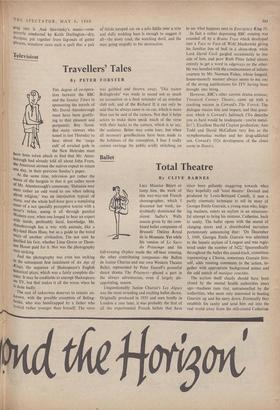Television
Travellers' Tales
By PETER FORSTER
THE degree of co-opera- tion between the BBC and the Sunday Times in sponsoring the travels of Mr. David Attenborough must have been gratify- ing to that pleasant and peripatetic Boy Scout. But many viewers who tuned in last Thursday to hear about the 'cargo cult' of awaited gods in the New Hebrides must have been taken aback to find that Mr. Atten- borough had already told all about John Frum, the American airman the natives expect to return one day, in their previous Sunday's paper. At the same time, television got rather the Worse of the bargain in that it got rather more of Mr. Attenborough's comments. 'Delusion may seem rather an odd word to use when talking about religion,' was an interjection typical of nlanY. and the whole half-hour gave a tantalising sense of a not specially perceptive tourist with a rover's ticket, seeing it all through puzzled Western eyes, when one longed to hear an expert Mt') inside, preferably local, knowledge. Mr. Attenborough has a way with animals, like a *Y-land Hans Haas, but as a guide to the weird Ways of another civilisation, I'm not sure he Justified his fare, whether Lime Grove or Thom- sen House paid for it. Nor was the photography very striking.
And the photography was even less striking In the subsequent first instalment of An Age of I( ngs, the sequence of Shakespeare's English historical plays, which was a fairly complete dis- aster. It may be creditable to attempt Shakespeare On TV, but that makes it all the worse when he is done badly.
The cast of unknowns deserves to remain un- known, with the possible exception of Boling- ,broke, who was handicapped by a father who looked rather younger than himself. The verse was gabbled and thrown away; 'This traitor Bolingbroke' was made to sound not so much an accusation as a final reminder of an overdue club sub; and of the Richard II it can only be said that he always came in on cue, which is more than can be said of the camera. Not that it helps actors to make them speak much of the verse with their backs to the camera, which is to say, the audience. Better may come later, but when all necessary genuflections have been made to the boldness of the conception, I fear I really cannot envisage the public avidly switching on to see what happens next in Emergency King 10.
In fact a rather depressing BBC evening was rounded off by a Brains Trust which developed into a Face to Face of Wolf Mankowitz giving his familiar line of bull in a china-shop, while Lord David Cecil gargled occasionally to one side of him, and poor Ruth Pitter failed almost entirely to get a word in edgeways on the other. He was handled with the condescension of infinite courtesy by Mr. Norman Fisher, whose languid, house-masterly manner always seems to me one of the strong justifications for ITV having been brought into being.
However, BBC's other current drama seminar, Twentieth Century Theatre, came up with a cracking success in Coward's The Vortex. The dialogue retains bite and impact, and that preci- sion which is Coward's hallmark (To describe you as hard would be inadequate—you're metal- lic!'). Excellent Harold Clayton production; Ann Todd and David McCallum very fine as the nymphomaniac mother and her drug-addicted son. Coward's 1924 development of the closet scene in Hamlet.






































 Previous page
Previous page